Week 12: Teaching/Coaching/Spreading the Word
> Search and the Information Landscape (530)
*Privacy, Consent, and the Virtual One-Shot – ACRLog (the current academic library situation)
Guest poster Nora Almeida is an instruction and outreach librarian at the New York City College of Technology (CUNY) and a volunteer at Interference Archive.
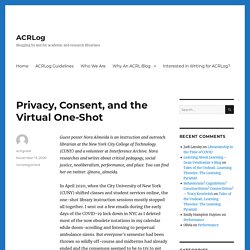
Nora researches and writes about critical pedagogy, social justice, neoliberalism, performance, and place. You can find her on twitter: @nora_almeida. In April 2020, when the City University of New York (CUNY) shifted classes and student services online, the one-shot library instruction sessions mostly stopped all together. I sent out a few emails during the early days of the COVID-19 lock down in NYC as I deleted most of the now obsolete notations in my calendar while doom-scrolling and listening to perpetual ambulance sirens. But everyone’s semester had been thrown so wildly off-course and midterms had already ended and the consensus seemed to be to try to get through the semester and then reset for fall. Certainly, the videos could be reused later, without my consent or when the information they contain is out of date.
Chat Reference in the Time of COVID-19: Transforming Essential User Services (Radford, Costello, Montague)
The Sift Archive — News Literacy Project. Reclaiming Reference (Sari Feldman)
I grew up without a local public library.
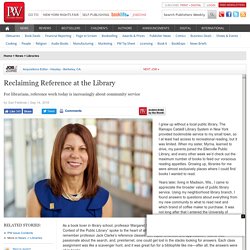
The Ramapo Catskill Library System in New York provided bookmobile service to my small town, so I at least had access to recreational reading, but it was limited. When my sister, Myrna, learned to drive, my parents joined the Ellenville Public Library, and every other week we’d check out the maximum number of books to feed our voracious reading appetites. Growing up, libraries for me were almost exclusively places where I could find books I wanted to read. Years later, living in Madison, Wis., I came to appreciate the broader value of public library service. Using my neighborhood library branch, I found answers to questions about everything from my new community to what to read next and which brand of coffee maker to purchase. As a book lover in library school, professor Margaret Monroe’s visionary work “Reader’s Services in the Context of the Public Library” spoke to the heart of what brought me to librarianship: a love of reading.
Lizard People in the Library. Mind Over Media: Analyzing Contemporary Propaganda. Digital Media and Library Instruction (Library Technology Report)
Project Information Literacy - Home. ACRL Presents: "Information Instruction at a (Social) Distance: Moving Library Instruction Online"
Standards for Distance Learning Library Services. Approved by the ACRL Board of Directors, July 2008.
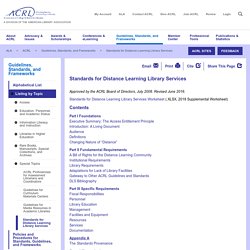
Revised June 2016. Standards for Distance Learning Library Services Worksheet (.XLSX, 2018 Supplemental Worksheet) Contents Part I FoundationsExecutive Summary: The Access Entitlement PrincipleIntroduction: A Living DocumentAudienceDefinitionsChanging Nature of “Distance”
School Librarian Role Pandemic Resources and Chart. An open access resource for faculty and librarians. *PRIMO: Peer-reviewd Instructional Materials Online Database. *ACRL Framework for Information Literacy Sandbox. SHEG: Civic Online Reasoning. Web Literacy for Student Fact-Checkers – Simple Book Production. Check, Please! Starter Course (Caulfield)
Poynter Media Wise E-Learning. Digital Citizenship Curriculum. URI Media Lab Teaching Resources (Renee Hobbs)
Center for News Literacy – Bringing crucial critical thinking skills for the 21st century to teachers and students. *Library 101 Toolkit (Duke University)
*Digital Media and Library Instruction LTR Vol 55, No 5 (2019)
S.O.S. for Information Literacy. A little help from our academic friends: Five fine portals for instructional fodder. Need a little inspiration for the coming school year?
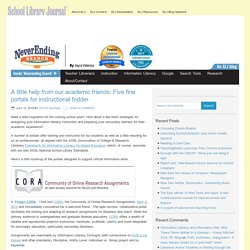
How about a few fresh strategies for energizing your information literacy instruction and preparing your secondary learners for their academic experience? A number of portals offer training and instruction for our students as well as a little retooling for us as professionals, all aligned with the ACRL (Association of College & Research Libraries) Framework for Information Literacy for Higher Education, which, of course, resonate with our own AASL National School Library Standards. Here’s a little round-up of the portals designed to support critical information skills. 1. Project CORA: I first met CORA, the Community of Online Research Assignments, back in 2016 and immediately considered her a welcome friend. Assignments are searchable by Information Literacy Concepts (with connections to ACRL’s six frames and other standards), Discipline, Ability Level, Individual vs. 2. 3. 5.
InfoLit for U MOOC Playlist. Curriculum_Materials. MERLOT II - Home. Research 101 (West Chester University)
Communication tips - For librarians - LibGuides at Gallaudet University Library. The first step in communicating with a person who is deaf or hard of hearing in a library setting is to determine the need.
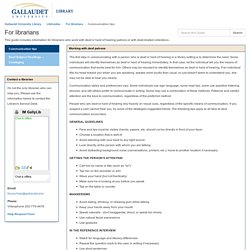
Some individuals will identify themselves as deaf or hard of hearing immediately. In that case, let the individual tell you the means of communication that works best for him.
The Information Literacy User's Guide: An Open, Online Textbook - Open SUNY Textbooks OER Services. Allison Hosier Allison Hosier is an Information Literacy Librarian at the University at Albany, SUNY.
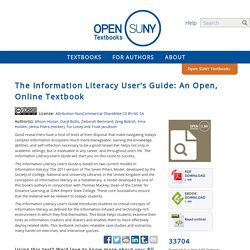
She has published and presented on research related to practical applications of the ACRL Framework for Information Literacy as part of information literacy instruction. Her recent research is focused on introducing and exploring the metaconcept that research is both an activity and a subject of study. Daryl Bullis Daryl Bullis is the Lead Instruction Librarian at Babson College.
Available Lessons – New Literacies Alliance. Reading Scientific Research Opens in a new windowAcademic research articles have a structure and language that is different from our other reading materials such as textbooks. This lesson can help students new to academic research understand these differences and learn strategies for finding information in such articles.
Level Up at the Texas A&M University Libraries. Murder in the Stacks: University of Toledo Libraries (Gamification example)
Empire State Information Fluency Continuum - NYC School Librarian Guidebook - Homepage at NYC DOE Office of Library Services.
UNLV University Libraries. Rubrics - RAILS. Rubrics are powerful tools for assessment.
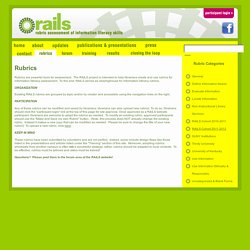
The RAILS project is intended to help librarians create and use rubrics for information literacy assessment. To this end, RAILS serves as clearinghouse for information literacy rubrics. Existing RAILS rubrics are grouped by topic and/or by creator and accessible using the navigation links on the right. Any of these rubrics can be modified and saved by librarians; librarians can also upload new rubrics. To do so, librarians should click the "participant login" link at the top of this page for site approval.
Database "Speed Dating"
Short Description: This activity introduces students to a variety of databases in their discipline by asking them to quickly review and prepare an “elevator speech” on the database’s best features and content. Students then do three rounds of “speed dating” to share with other students what they’ve discovered. Additional Instructor Resources (e.g. in-class activities, worksheets, scaffolding applications, supplemental modules, further readings, etc.
Teaching strategies and tips. Tutorials & Videos - The Claremont Colleges Library. Start Your Research contains 4 modules, each requiring 10-15 minutes to complete.
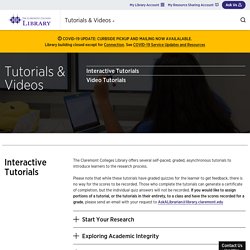
After completing all of the modules, learners will be able to Understand the goal(s) of your assignmentDetermine the information you needExplain how knowledge is created over timeFind the information you need in the library Module 1: Understand Your Assignment By the end of this module, you’ll be able to Explain what your assignment is asking you to doChoose your topicModify the scope of your topic. Education Services - University at Buffalo Libraries. Librarians from the University at Buffalo (UB) Libraries are active participants in building the information literacy competencies of students at the undergraduate, graduate, and professional levels.

UB librarians work with faculty and teaching assistants to introduce research resources, consult on research projects, provide information literacy instruction, and integrate library resources into programs, courses, and curricula. Micro-CredentialsThe Advanced Information Literate badge is designed to build upon a student’s search skills and expertise in the information literacy concepts that underpin scholarship at a Tier 1 Research Institute. WorkshopsThe Libraries work with other areas on campus to offer workshops on a variety of subjects relevant to students, faculty, and staff.
How Information Works – OHIO University Libraries. This summarizes the document, ACRL Framework for Information Literacy for Higher Education.
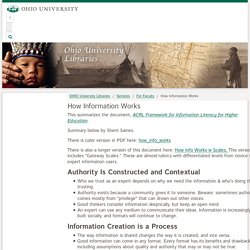
Summary below by Sherri Saines. There is color version in PDF here: how_info_works There is also a longer version of this document here: How Info Works w Scales, This version includes “Gateway Scales.”
ACRL Frameworks Posters – Librarian Design Share. The Mindful Instruction Librarian and the "One-Shot"
Wayfinding the Web: Applying Critical Information Literacy to a Google Instruction Session. Fake news and information credibility became hot topics in late 2016. However, even before the U.S. presidential election cycle, librarians at the Yale Center for Science and Social Science Information (CSSSI) started to adapt Google workshops to address the changing online credibility environment.
We have taught workshops on effective Google searching since 2012, developing the series because we observed that many researchers in the sciences and social sciences “satisficed” their information and research inquiries using Google and Google Scholar. The workshops meet students, faculty, and staff at their points of need and acknowledge that Google and Google Scholar are part of their research toolkits. In addition to 30-minute workshops targeted at undergraduates, we also teach 60- or 90-minute sessions on Google Scholar and My Citations, Google Images, Google News, and other Google products.
Information Literacy Assessment.
Association of College & Research Libraries (ACRL)
Approved by the ACRL Board of Directors, April 28, 2017. This document is a revision of the 2007 ACRL Standards for Proficiencies for Instruction Librarians and Coordinators.
Curriculum - Applied Digital Skills from Google. The Research Games. Happy - Texas A&M University Libraries. JSTOR Updates Blog - LibGuides at JSTOR - LibGuides at JSTOR. Bing - Explore. Brown Bag Series: Leslin Charles for the GSE. S.O.S. for Information Literacy. Information Literacy Assessment. University of Albany Information Literacy Home. Information Literacy in the Disciplines Guide. Instruction Section Website The Instruction Section is part of ACRL, a division of ALA. Skip to content Information Literacy in the Disciplines Guide This site contains links and citations to information literacy standards and curricula developed by accrediting agencies, professional associations, and institutions of higher education.
Resources listed were identified by the “Information Literacy in the Disciplines Committee” through contacting accrediting agencies, conducting literature reviews, and searching the web. Arts & Humanities Cultural Studies Professional Studies Science & Engineering Social Sciences Other Standards & Resources Note: The discipline titles above are based on the National Center for Education Statistics’ Classification of Instructional Programs (2000 Edition). ©2015 American Library Association 50 E Huron St., Chicago IL 60611 1.800.545.2433Copyright StatementPrivacy Policy Instruction Section Website Proudly powered by WordPress.
Lynda.com Information Literacy (scan)
Weaving Information Literacy Skills to Engage Learners (Kathy Schrock)
The Library Minute. Guide on the Side. My Learning Essentials (The University of Manchester Library)
Guide on the Side. Purdue Libraries. INFOhio. INFOhio: Ask! Act! Achieve!
MERLOT II - Home. PCC Library. Chapter 2. Digital Collections. LMS Embedded Librarianship LMS embedded librarians are engaged in student learning according to the Ithaka S+R US Library Survey 2013. They confer with faculty members to discover what their learning outcomes are and what their research assignments entail.
After considering what students will have to know and do as researchers, the librarian identifies which subject databases are most appropriate.
Chapter 1. LMS Embedded Librarianship and the Educational Role of Librarians. Gale Training - Product List - Gale Training - Gale. Search Education – Google. Library That Learns You. NoodleTools : Show Me Information Literacy Modules.
Library 101 Toolkit – A resource for librarians and writing instructors. *23 framework things. Getting Started with Research (UCLA)
Credo IL Strategy Handbook Full release. Four Moves – Adventures in fact-checking for students. *Interacting with Library Users. *Online Searching: 3 Interview. Thinglink 360 Examples. Plagiarism Game - Snowden Library. H5P – Create and Share Rich HTML5 Content and Applications (Try out some new strategies)
Reading Strategies: Turn Headings Into Questions (UCLA)
WI+RE's Design Tools - WI+RE (UCLA)
Learner-centered design The build something toolkit Empathy mapping, journey mapping, user feedback, and rapid-prototyping tools to help guide you through a learner-centered design process.
All materials in this toolkit are CC BY 4.0: Brecher Cook, Dani, & Worsham, Doug. (2018, April). Let’s Build Something! (The Toolkit). A Rapid-Prototyping Instructional Design Workshop.
Web Literacy for Student Fact Checkers – Web Literacy for Student Fact-Checkers. *Research Basics: an open academic research skills course - LibGuides at JSTOR. Mike Caulfield's latest web incarnation. Networked Learning, Open Education, and Digital Polarization. Why Information Literacy? - Faculty Guide to Instruct - LibGuides at Credo Reference. WASSAIL - Information Literacy - Subject Guides at University of Alberta Libraries.
WASSAIL is a database-driven, web-based application employing PHP, MySQL, and Javascript/AJAX technologies.
Be Credible – Simple Book Publishing. Google News Initiative Training Center. Be Credible: Information Literacy for Journalism, Public Relations, Advertising and Marketing Students. Website Evaluation Game (British Columbia Institute of Technology)
Library and Information Resources Network, Inc.
NoodleTools : Show Me Information Literacy Modules. Information Literacy Home. Classroom Management and the Librarian.










